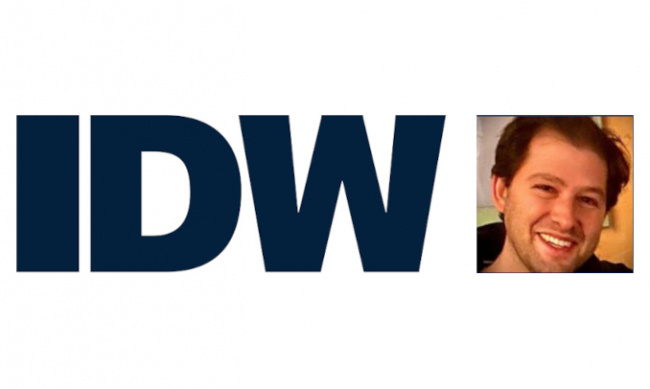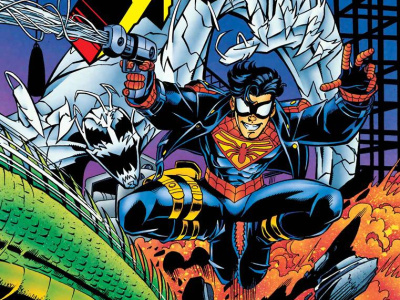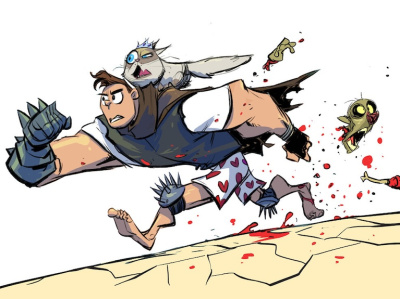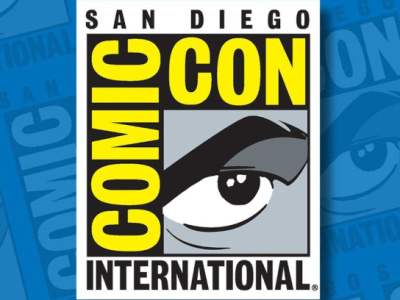In part one of a lengthy interview, incoming CEO of IDW Entertainment Davidi Jonas talked about the company’s publishing plans, including output, its retailer and distributor relations, licensed books, originals, and more (see "IDW CEO Davidi Jonas Interview Part 1"). In Part 2, he discussed the crisis facing the publisher that required shareholders to take swift action to reduce costs and restructure the company (see "IDW CEO Davidi Jonas Interview Part 2").
In the third and final part of the long interview with new IDW CEO Davidi Jonas, we discussed the company’s media pipeline and the prospects for current and future projects, with a sidebar on a bigger role for Chris Staros and Top Shelf Books. This is intimately tied in with the success of IDW’s publishing, licensing and creator plans in that the company had made a huge investment in its own media production arm in part to retain creative control of the execution of its flagship IP, Locke & Key.
Now that the landscape in Hollywood has changed, how well does IDW’s business model hold up, and how intent is Jonas on sticking to the original plan for the media unit?
Our conversation has been edited for length and clarity.
Rob Salkowitz, ICv2: Have there been any changes to your recent entertainment-related announcements in terms of titles in development?
Davidi Jonas: Are you familiar with the graphic novel Ballad for Sophie (see "2022 Eisner Awards Nominees")? Someone from Hollywood reached out (someone who a showrunner), and they're excited about this title at IDW. It's a French title and they wanted to know if we could work on it together. I said, "No, the creators are Portuguese; the story takes place in in France, so get it right!"
I texted this person, who I like a lot. I'm hoping we have an opportunity to work together. And I texted this person, "Do not bullshit me." I said if you're just telling me you like the story, you know it's a kiss, kiss, hug, hug, but you're not really spending the time getting engaged, I don't want to work with you. This is a beautiful story; it's a brilliant story; you want to be all in. Then we can work together. If not, I'm not interested in working with you. And in that moment, the person sent me a text message with a picture of the book on their lap, open in front of them. I was like, alright, this guy, he's doing the work.
That's the level of excitement and passion we’re looking for. I showed it to Chris Staros, who's the editor at Top Shelf who helped bring that story to market; I showed him the text message. So we're going to do that for every title. We will love all of our children equally and we will be passionate about helping our creators to tell that story.
How does Top Shelf Books fit in going forward?
I think Top Shelf and Chris, hopefully, are going to take on more of an integrated leadership role in the company. We talked about how Mark [Doyle] and Tara [McCrillis] are the co-publishers (see "People on the Move"), but the reality is we really have three co-publishers because Chris Staros of Top Shelf is also a publisher in IDW, and I certainly want him to be part of the leadership going forward.
He and I really hit it off, and I told Chris the only thing I don't like about him is that everybody likes him. That's just unsettling! But he really is such a nice person. He has incredible taste, and he knows best. I think it’s going to bring a lot of value to the company to have his perspective, not just in storytelling and editorial, but also in terms of fan engagement and business development and sales and marketing. I think he's going to bring a lot of value across different business areas.
The media pipeline was the key driver in the big increase in the value of IDW in the 2010s. How healthy is that pipeline now, and do you remain committed to the strategy of using IDW Entertainment to develop your own titles?
That's a good question. I don't want to say yet what we're going to do in media in terms of how we're going to bring franchises to market. I say that because I'm not certain that we've found the right model for how to create the most value for the company, and for the franchises, and for the creators that we work with.
We're not pulling back. If anything, I want to keep the option open that we might decide to top up and go stronger on entertainment and invest more resources into entertainment. The model for the last few years, which we're continuing right now, is that we are non-writing executive producers, which means that we do give up a degree of creative control to the partners that we work with, whether it be a streamer or a cable company or movie studio.
We're continuing with that model in terms of the pipeline. Having just looked over one division of the company in terms of opportunities that we're bringing to Hollywood and things that are under discussion, it is a robust pipeline with dynamic and differentiated stories. It's not like all of our stories are horror, or all of our stories are in kids or young adult. We are not limited to a single genre, so that gives us a lot of different media companies to partner with and to share our storylines with.
What changes do you plan to make in how you take your content out to other media?
The first thing that we're doing is reenergizing our commitment to the stories that we do sell. We are doing an audit, looking back and seeing how the entertainment division has worked over the last five years. There was a certain "broad perspective" in trying to create an IP library and put things aside for a rainy day to have more IP in the catalog or to create equity value in the companies, so that one day, when somebody wants to buy the company for its vault of IP, it's sitting on the shelf.
I see that and I understand the business sense of it, but from the creative perspective it doesn't drive a lot of value, because there is a window of time when a title is hot. When the title is coming out, it's coming to market, there's energy from the creators and from the fans. If we miss that opportunity to take that excitement and build additional excitement and additional metrics on top of that (social engagement, TikTok engagement, other forms of reaching fans, live entertainment engagement), it does a disservice to the property, the creators and the company.
Obviously, creators like to see their titles get to the broadest market possible. They're in business. They'd also like to make money, and having something sit on a shelf doesn't create a lot of value for them or for the fans. As time goes on and you don't continue to tell the story and refresh it, eventually it fades from people's consciousness. So we are intentional and focused on selling titles into entertainment in a rapid clip. We need to strike while the iron is hot and that's one of the things that I see when I look at our entertainment division
Is this changing the way you pitch to media partners?
I think so, there's real passion to do that. Not to say there hasn't been in the past, because I'm sure there was. I think people appreciate authenticity and honesty and commitment to story. And I think if we go into a room and say, "Hey, we’ve got 12 different great stories to tell you about," it's like, "Well, then you really don't have anything to tell me about."
If you're so focused on 50 things or on 12 things, it almost feels like you're just hedging your bets. I don't want to pitch 10 things or 25 things. It's not. "I’ve got a little bit of this, a little bit of that." I want to be very intentional.
If I'm selling a Steve Niles title, I want to go in there talk to the buyers that make sense for it and really pitch it, really tell the story and sell it in the room. And if I'm pitching Codex Black and it's a different audience and it's a different creator, I want to go in and be fully committed to telling that story in that moment. I think that that's going to resonate with buyers because they want to buy things that are compelling too. They're also consumers, and for them to find something engaging, they need to be engaged.
Emotions are contagious, if we come in and we are so passionate about what we're doing. Like I told one of our licensors, "Just make sure when we come to meet with you that you have some sort of a face guard on because the energy coming off of us is going to be so real and authentic that it might blind you." And that's the way that I want us to sell our titles.
Well passion and focus are great, but the media landscape has changed substantially over the past year or two. The streaming gold rush is over, at least for now. How do you make that work if there isn’t money on the other side of the table?
In terms of the pipeline that we do own, we already do have control over pushing those into entertainment. We've already made the investment. Now the cost of running an entertainment division in a more integrated and streamlined organization, it's a much lower cost structure. So the justification to keep that division open as a baseline is much lower.
I'm not saying that we're going to have the same sort of check sizes that we've had in years past. Maybe there was a gold rush. But first of all, it's a cyclical industry. What's true today was not true four years ago, but it might be true in in another four years, so the value of content may rise yet again.
And I think that at the end of the day, it’s not an industry-wide question. It becomes a title-specific question, and that's why I want to focus specifically on titles. Yeah, I agree as a median. If you just wanted to pluck 300 titles out of the air and say, would they have been made five years ago? Would they get made today? The median is going to be lower.
But if you take an individual title, say Succession as an example, Succession is doing great. I mean, it's making huge value. If you took that and you compared it with 25 other titles that aren't like that, what kind of representation is that?
If we're going to sell something, we believe it's a top tier title now. Maybe everybody feels that way and we're going to just get drowned out in the cacophony of sales pitches. But I've been in Hollywood before. I've been in sales pitches. I've seen the meetings. I don't think that’s going to happen.
On the buy side, I don't think they're going to find sellers that are as committed and excited about the stories that they're selling, and have the compelling backstory and sales materials and fan engagement. They’ll say, "Well this is not such a hard decision to make as you've already done all the work for us. You've already created the franchise, and now we just have to broaden it." I don't think that there's going to be another company that has the ability to sell as passionately, and have all those metrics to support a decision for a buyer to go forward with an entertainment project.
Click here for Part 1 and click here for Part 2 of this three-part interview.
Rob Salkowitz (@robsalk) is the author of Comic-Con and the Business of Pop Culture.

Column by Rob Salkowitz
Posted by Rob Salkowitz on May 12, 2023 @ 3:36 am CT
MORE COMICS
Part of 1996 Marvel/DC Crossover
August 1, 2025
Writer Karl Kesel and artist Mike Wieringo are the creative team for the one-shot comic, which was first published in 1996 in the middle of a Marvel/DC crossover.
Crowdfunding Campaign Launches in October, Followed by Retail Release
August 1, 2025
Vault will crowdfund the graphic novel on the Backerkit platform in October, then release it to retail.
MORE COLUMNS
Column by Scott Thorne
July 28, 2025
This week, columnist Scott Thorne comments on the Edge of Eternities prerelease and on Magic: The Gathering news from the Hasbro earnings report.
Column by Rob Salkowitz
July 21, 2025
Columnist Rob Salkowitz lays out the Comic-Con panels of interest to industry professionals, current and aspiring creatives, educators, librarians and retailers.









